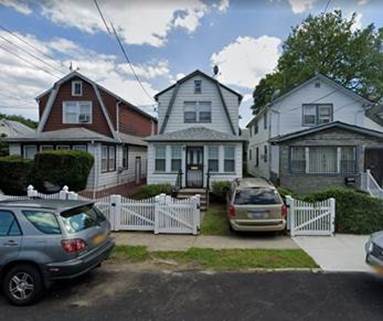Mayor Adams wants New York to be the "City of Yes" — but will he finally say "no" to parking?
On Monday, the Department of City Planning will begin a lengthy review process in support of three rezoning initiatives collected under Mayor Adams's "City of Yes" motto — and buried in the housing portion of the proposal is a provision to "prioritize people over parking to make streets safer, and reduce requirements to enable more of the housing, services, and amenities that help neighborhoods thrive."
Depending on how bold Adams's "yes" is, a resulting zoning change could completely scrap, or merely tweak, the longstanding rule that requires developers to include off-street parking spaces (the exact number is determined based on the use of the building and other factors) — a requirement that tends to "make housing more expensive, disrupt pedestrian-friendly streets, or block a homeowner from adding an accessory unit for an aging parent," the Planning Department said in a statement.
Advocates hope it's a full-throated "yes."
"Eliminating parking requirements is proven to reduce pollution, congestion and housing costs. ... This is our golden opportunity to make New York’s infamously byzantine zoning code simpler and more equitable with a single action: eliminate parking mandates entirely, citywide," said Sara Lind, policy director at Open Plans, which (with Open New York) has been spearheading a campaign to eliminate parking minimums entirely. [Full disclosure: Open Plans is the parent company of Streetsblog.]
Lind pointed out that the city has sometimes tweaked the zoning code — or given individual developers waivers from parking requirements on a case-by-case basis — but that "piecemeal" approach ends up only benefitting "wealthier, Whiter neighborhoods."
"Every corner of the city should be given the chance to have more affordable housing, safe streets, and clean air," she said.
This is good! We want more!
— Open Plans (@OpenPlans) October 7, 2022
The strategy should be to eliminate all parking requirements, not just reduce them. Buffalo did it. California did it. https://t.co/F0ESLCfJfh
Lind and other advocates cite a virtually limitless library of studies about the deleterious effect of requiring developers to include a minimum number of off-street parking spaces, including:
- A UCLA study showed that developers pass along the cost of parking spaces at about $1,700 per year per unit — or an additional 17 percent of a unit’s rent. Not only does that hide the cost of parking, but it's an especially unfair burden for carless renters (who typically have lower incomes) who are paying for parking that they do not need or want.
- In a 2016 study, the Center for Neighborhood Technology found that each parking space in Chicago cost developers $37,000 — a cost that also "discourages developing affordable housing near transit, where the cost of land comes at a premium." An earlier study in San Francisco showed that "single-family houses and condominiums were more than 10 percent more costly if they included off-street parking." And a 2014 study showed that parking requirements reduce the number of units by 13 percent.
- A 2013 study partially written by parking legend Donald Shoup pointed out that "the idea that parking requirements ?ght traffic congestion contains a contradiction: Parking requirements create room for vehicles, and vehicles cause congestion. Thus a law requiring developers to provide on-site parking indirectly reduces the price of driving andshould lead to more driving rather than less." Off-street parking tends to increase vehicle density, and, as a result, "residents’ fear of vehicle density ... spurs opposition to new housing and higher density." In other words, "Increasing the supply of parking makes parking less expensive. ... This in turn makes owning a vehicle arti?cially cheap, even as it in?ates the development cost and purchase price of housing."
- A 2015 Manhattan Institute study said that the parking requirement added about 50 percent of the floor area needed for each 900-square-foot apartment, a huge waste of limited development space. And the creation of off-street parking has "negative externalities," including encouraging car ownership.
- A 2010 study showed that New York "developers tend to build only the bare minimum of parking required by zoning, suggesting that ... developers do not simply build parking out of perceived marked need" but because they are required to do it.
- Multiple cities that have reduced or eliminated parking requirements have great on-the-ground experiences:
- In urban centers and and transit-oriented locations in Seattle, developers built 40 percent less parking than would otherwise have been required, which resulted in 18,000 fewer parking spaces and savings of $537 million in direct construction costs over five years, which, according to a 2020 study, "likely benefited both housing developers and consumers alike."
- After Buffalo repealed minimum parking requirements citywide, developers built less parking and were freed up "to transform parking lots to 'higher uses,'" according to a 2021 study.
- Preliminary info from Minneapolis, which scrapped parking minimums last year, showed that "projects began offering rents below the market’s established levels. New studio apartments, which typically went for $1,200 per month, were being offered for less than $1,000 per month.”
(Aaron Carr collected even more studies in this Twitter thread.)
Studies are one thing, but developers who work on (or under) the ground are also supportive of reducing or eliminating mandatory parking rules — a rare confluence of progressive urbanists and developers.
"We're very supportive of a citywide effort," said Dave Lombino, an executive at Two Trees, the Brooklyn-based developer of such projects as the Domino waterfront complex and virtually all of DUMBO. He said his company "automatically" files paperwork seeking waivers from parking requirements because the current rules require the construction of far more parking than the public wants, which adds a cost to development that isn't even offset by a public benefit.
"At Domino, the rules required us to build 1,500 off-street spots, and we got it down to 1,000, which is still far more than we wanted to build," he said. "So far, we have built a 700-space garage at 325 Kent Avenue and it's empty. And we're required to build 300 more spaces. We'd prefer not to, but we have to."
Lombino estimated that all that parking added "tens of millions" onto the cost of the $3-billion development — a rounding error, certainly, but one that could have led to an additional public benefit.
Developer Tucker Reed called the parking minimums "so antiquated that they're insane!"
"The zoning code generally is from the 1960s, and are clearly out of date for a modern city," added Reed, principal at Totem, a developer of affordable housing (which is exempt from the parking minimums if the units are near transit).

The Department of City Planning declined to discuss potential zoning changes in advance of an actual proposal that will be informed by public comment, but the agency did provide a few examples to back up Reed's comment. For example, the owners of houses like the one to the right can't add a new dwelling unit or a second apartment for a renter due to high parking requirements that would require one spot per unit — which the agency says is not feasible for many small buildings with small lots or shared driveways.
Other property owners decline to build even small buildings because any development with 11 units would have to include six off-street parking spaces — a high bar, the agency said.
There is precedent for curtailing parking mandates: in 1982, all parking minimums were eliminated in Manhattan below 96th Street on the East Side and below 110th Street on the West Side (though that change was in response to the 1970 Clean Air Act). Later, parking minimums were reduced dramatically for Downtown Brooklyn and parts of Long Island City.
And in 2016, the city’s Zoning for Quality and Affordability plan eliminated parking minimums for fully affordable housing developments in transit-rich areas; and as part of neighborhood-wide rezoning plans such Inwood, the city also lowered or eliminated parking minimums for all new developments.
As such, Reed thinks the politics are right for an initial full exemption for affordable housing developments, whether near or not-so-near to transit.
"Every spot you're required to build puts pressure on another part of the development to make more money," he said. "If you do't have to build parking, it frees you up to do more affordability."
Lombino added that the time is right, politically.
"It used to be the hardest thing in city government to kill parking, but that may not be true anymore," he said. "Advocates have done important work. It's easier to kill parking than it's ever been."
But both Reed and Lombino said the Council may want to pick from a menu of options. Council members in transit-rich areas with very low car ownership will likely support a full elimination of parking minimums, while pols in areas where many residents rely on cars will likely want to keep some form of parking requirement lest car owners complain that they won't be able to find parking if any new housing is approved.
Council Speaker Adrienne Adams was noncommittal in an interview with Streetsblog on Wednesday, though she did say that when it comes to approving housing and getting it built, the "process is broken."
"We hope to lessen the bureaucracy that it takes to build housing," she said, citing the city's ongoing housing "crisis."
"Certainly, everything should be considered," she added. "Number one, there's a housing crisis in the city right now. So our focus, really, in my estimation, remains on that. We'll review any proposals."
In the absence of Council action, which won't come until next year at the earliest, Council members who represent more than half of Brooklyn formed a coalition that is demanding that developers ask for a parking waiver before moving ahead with any project in their districts.
One of the organizers of that effort, Council Member Lincoln Restler, said he was "encouraged" that the Department of City Planning is taking up the effort, though he pointed out that there are no specific proposal yet.
"In urban hubs like Lower Manhattan, the heart of the South Bronx, Downtown Brooklyn or Downtown Jamaica, we need affordable housing, economic development with good jobs, and dynamic mixed use buildings, not more parking," he said.
The city's zoning changes are moving in parallel with a state effort that might end up being a heavier lift. State Sen. Brad Hoylman has a bill that approximates what the advocacy groups are calling for: it would eliminate all parking minimums in the city.
"I don't think parking spaces are a worthwhile use of valuable space when we have the worst housing crisis," Hoylman said, though he admitted that some developers might still want to include parking as an amenity.
"They can still build some, but the existing mandate is something from the 20th century," he said. "For the first time, there is a movement from both the left and the right to tackle this glaring issue that contributes to the housing crisis."
The "City of Yes" information panel is on Monday, Oct. 17 at 7 p.m. Click here to watch.






